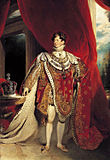
1756 (MDCCLVI) was a leap year starting on Thursday of the Gregorian calendar and a leap year starting on Monday of the Julian calendar, the 1756th year of the Common Era (CE) and Anno Domini (AD) designations, the 756th year of the 2nd millennium, the 56th year of the 18th century, and the 7th year of the 1750s decade. As of the start of 1756, the Gregorian calendar was 11 days ahead of the Julian calendar, which remained in localized use until 1923.
The 1700s decade ran from January 1, 1700, to December 31, 1709.

1764 (MDCCLXIV) was a leap year starting on Sunday of the Gregorian calendar and a leap year starting on Thursday of the Julian calendar, the 1764th year of the Common Era (CE) and Anno Domini (AD) designations, the 764th year of the 2nd millennium, the 64th year of the 18th century, and the 5th year of the 1760s decade. As of the start of 1764, the Gregorian calendar was 11 days ahead of the Julian calendar, which remained in localized use until 1923.

The 1760s was a decade of the Gregorian calendar that began on January 1, 1760, and ended on December 31, 1769.
The 1730s decade ran from January 1, 1730, to December 31, 1739.

The 1740s decade ran from January 1, 1740, to December 31, 1749. Many events during this decade sparked an impetus for the Age of Reason. Military and technological advances brought one of the first instances of a truly global war to take place here, when Maria Theresa of Austria’s struggle to succeed the various crowns of her father King Charles VI led to a war involving nearly all European states in the War of the Austrian Succession, eventually spilling over to North America with the War of Jenkins’ Ear. Capitalism grew robust following the fallout of the South Sea bubble two decades and the subsequent reign of Sir Robert Walpole, whose rule ended in the earlier half of this decade.
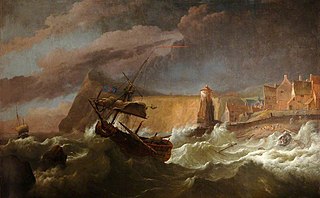
1691 (MDCXCI) was a common year starting on Monday of the Gregorian calendar and a common year starting on Thursday of the Julian calendar, the 1691st year of the Common Era (CE) and Anno Domini (AD) designations, the 691st year of the 2nd millennium, the 91st year of the 17th century, and the 2nd year of the 1690s decade. As of the start of 1691, the Gregorian calendar was 10 days ahead of the Julian calendar, which remained in localized use until 1923.
The 1690s decade ran from January 1, 1690, to December 31, 1699.

1618 (MDCXVIII) was a common year starting on Monday of the Gregorian calendar and a common year starting on Thursday of the Julian calendar, the 1618th year of the Common Era (CE) and Anno Domini (AD) designations, the 618th year of the 2nd millennium, the 18th year of the 17th century, and the 9th year of the 1610s decade. As of the start of 1618, the Gregorian calendar was 10 days ahead of the Julian calendar, which remained in localized use until 1923.
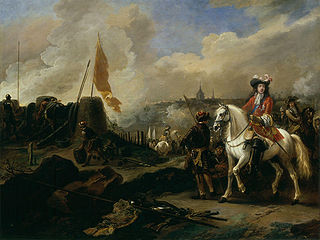
1685 (MDCLXXXV) was a common year starting on Monday of the Gregorian calendar and a common year starting on Thursday of the Julian calendar, the 1685th year of the Common Era (CE) and Anno Domini (AD) designations, the 685th year of the 2nd millennium, the 85th year of the 17th century, and the 6th year of the 1680s decade. As of the start of 1685, the Gregorian calendar was 10 days ahead of the Julian calendar, which remained in localized use until 1923.
The 1710s decade ran from January 1, 1710, to December 31, 1719.
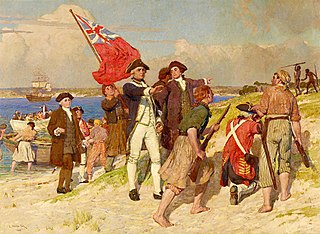
1770 (MDCCLXX) was a common year starting on Monday of the Gregorian calendar and a common year starting on Friday of the Julian calendar, the 1770th year of the Common Era (CE) and Anno Domini (AD) designations, the 770th year of the 2nd millennium, the 70th year of the 18th century, and the 1st year of the 1770s decade. As of the start of 1770, the Gregorian calendar was 11 days ahead of the Julian calendar, which remained in localized use until 1923.

1758 (MDCCLVIII) was a common year starting on Sunday of the Gregorian calendar and a common year starting on Thursday of the Julian calendar, the 1758th year of the Common Era (CE) and Anno Domini (AD) designations, the 758th year of the 2nd millennium, the 58th year of the 18th century, and the 9th year of the 1750s decade. As of the start of 1758, the Gregorian calendar was 11 days ahead of the Julian calendar, which remained in localized use until 1923.

1744 (MDCCXLIV) was a leap year starting on Wednesday of the Gregorian calendar and a leap year starting on Sunday of the Julian calendar, the 1744th year of the Common Era (CE) and Anno Domini (AD) designations, the 744th year of the 2nd millennium, the 44th year of the 18th century, and the 5th year of the 1740s decade. As of the start of 1744, the Gregorian calendar was 11 days ahead of the Julian calendar, which remained in localized use until 1923.

1740 (MDCCXL) was a leap year starting on Friday of the Gregorian calendar and a leap year starting on Tuesday of the Julian calendar, the 1740th year of the Common Era (CE) and Anno Domini (AD) designations, the 740th year of the 2nd millennium, the 40th year of the 18th century, and the 1st year of the 1740s decade. As of the start of 1740, the Gregorian calendar was 11 days ahead of the Julian calendar, which remained in localized use until 1923.
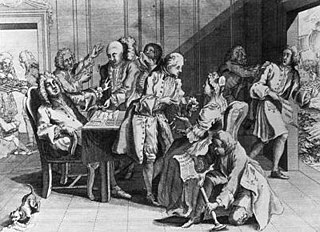
1738 (MDCCXXXVIII) was a common year starting on Wednesday of the Gregorian calendar and a common year starting on Sunday of the Julian calendar, the 1738th year of the Common Era (CE) and Anno Domini (AD) designations, the 738th year of the 2nd millennium, the 38th year of the 18th century, and the 9th year of the 1730s decade. As of the start of 1738, the Gregorian calendar was 11 days ahead of the Julian calendar, which remained in localized use until 1923.

1714 (MDCCXIV) was a common year starting on Monday of the Gregorian calendar and a common year starting on Friday of the Julian calendar, the 1714th year of the Common Era (CE) and Anno Domini (AD) designations, the 714th year of the 2nd millennium, the 14th year of the 18th century, and the 5th year of the 1710s decade. As of the start of 1714, the Gregorian calendar was 11 days ahead of the Julian calendar, which remained in localized use until 1923.

1713 (MDCCXIII) was a common year starting on Sunday of the Gregorian calendar and a common year starting on Thursday of the Julian calendar, the 1713th year of the Common Era (CE) and Anno Domini (AD) designations, the 713th year of the 2nd millennium, the 13th year of the 18th century, and the 4th year of the 1710s decade. As of the start of 1713, the Gregorian calendar was 11 days ahead of the Julian calendar, which remained in localized use until 1923.

1701 (MDCCI) was a common year starting on Saturday of the Gregorian calendar and a common year starting on Wednesday of the Julian calendar, the 1701st year of the Common Era (CE) and Anno Domini (AD) designations, the 701st year of the 2nd millennium, the 1st year of the 18th century, and the 2nd year of the 1700s decade. As of the start of 1701, the Gregorian calendar was 11 days ahead of the Julian calendar, which remained in localized use until 1923.

1694 (MDCXCIV) was a common year starting on Friday of the Gregorian calendar and a common year starting on Monday of the Julian calendar, the 1694th year of the Common Era (CE) and Anno Domini (AD) designations, the 694th year of the 2nd millennium, the 94th year of the 17th century, and the 5th year of the 1690s decade. As of the start of 1694, the Gregorian calendar was 10 days ahead of the Julian calendar, which remained in localized use until 1923.


